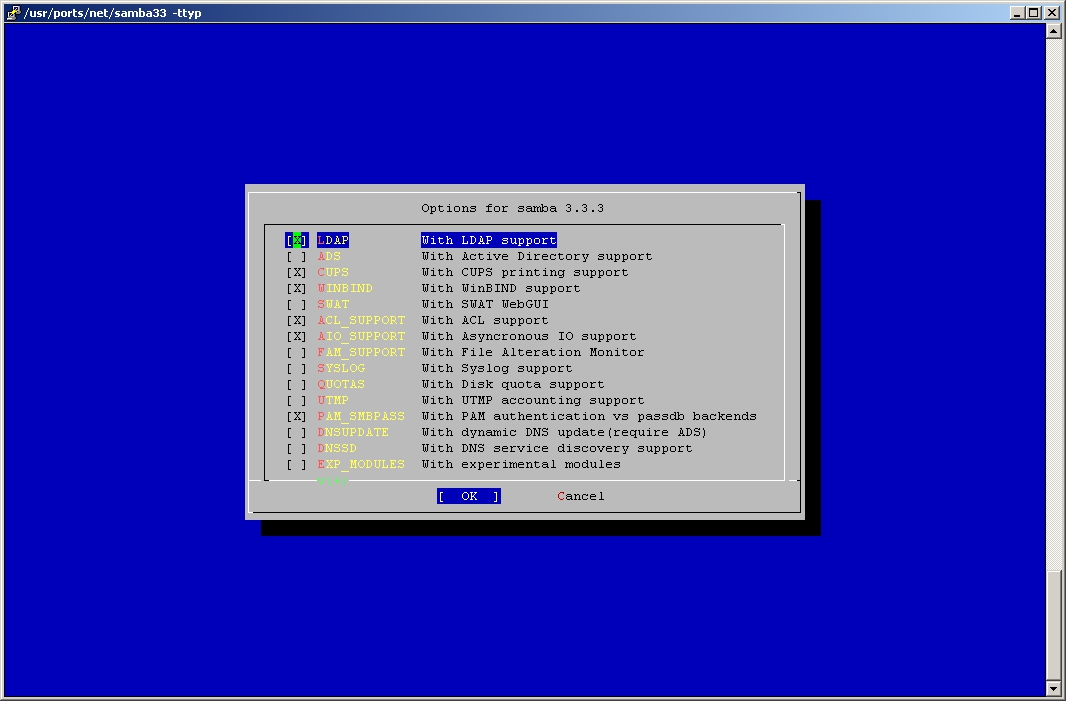samba 3028a vs 333 on freebsd 71
2009-04-19
!!! UPDATE on 12/29/2009!!! Since this blog post seems to get a good amount or hits from google, if you are reading this, please see my updated post: http://www.mywushublog.com/2009/12/freebsd-8-0-a-great-nas-server/ which has some additional information about FreeBSD 8.0 EOF
Lately at work, I’ve been involved with a very large file system that is being export from Solaris 10/ZFS to windows and OS X users via Samba. Even with a very large Sun server (T5220) a lot of users are complaining about the slow performance of the system. I’m not going to go into details, but what it has prompted me to do is to look into what I use at home (FreeBSD + Samba) for my network storage needs, and see if I can improve the performance of it.
Well, I was checking out the very useful Whats cooking for FreeBSD 8, unrelated to my Samba needs, when I noticed this post on Ivan Voras’ blog. Ivan has some really cool information there, and with this new knowledge I began my update from running Samba 3.0.28a,2 to 3.3.3,0 (the comma represents the Ports version).
Hvala Ivan!
I’ve discussed my new FreeBSD environment before here, with that, here are some quick details:
-
OS: FreeBSD 7.1
-
Intel Core 2 Duo E6750 (2.66Mhz 4MB cache)
-
Intel S975XBX2 workstation motherboard
-
AMCC 3Ware 9650SE 4 port SATA RAID controller (4x PCI-e)
- BatterY backup for the 3Ware so I can enable cached writes
-
2GB ECC Crucial Memory Kit
-
ASUS EN6200 LE 16x PCI-e nVidia GFX card
-
4 Western Digital 1TB Drives
The 4 1TB drives create a nice 2.6TB (RAID5) array which I used Samba to share out to my 4 other systems in the house (which is a mix of Windows XP and Vista, sorry, no OS X). I do a lot with this array, any work that Michele and I do like photo editing, word documents, media files, etc.. all gets saved to this volume. Needless to say, this volume is accessed A LOT, and if the house ever caught on fire, I’d save the server before the family (Hey, I could still look at their pictures and videos…).
The Old Configuration
samba 3.0.28a:
[root@server samba3]> make showconfig
===> The following configuration options are available for samba-3.0.34,1:
LDAP=on "With LDAP support"
ADS=on "With Active Directory support"
CUPS=on "With CUPS printing support"
WINBIND=on "With WinBIND support"
ACL_SUPPORT=on "With ACL support
AIO_SUPPORT=on "With Asyncronous IO support"
FAM_SUPPORT=on "With File Alteration Monitor"
SYSLOG=on "With Syslog support"
QUOTAS=off "With Disk quota support"
UTMP=on "With UTMP accounting support"
PAM_SMBPASS=off "With PAM authentication vs passdb backends"
CLUSTER=off "With experimental cluster support"
DNSUPDATE=off "With dynamic DNS update(require ADS)"
EXP_MODULES=off "With experimental modules"
POPT=on "With system-wide POPT library"
PCH=on "With precompiled headers optimization"
MAX_DEBUG=off "With maximum debugging"
SMBTORTURE=off "With smbtorture"
===> Use 'make config' to modify these settingsThe New Configuration
samba 3.3 config:
[root@server samba33]> make showconfig
===> The following configuration options are available for samba-3.3.3:
LDAP=on "With LDAP support"
ADS=off "With Active Directory support"
CUPS=on "With CUPS printing support"
WINBIND=on "With WinBIND support"
SWAT=off "With SWAT WebGUI"
ACL_SUPPORT=on "With ACL support"
AIO_SUPPORT=on "With Asyncronous IO support"
FAM_SUPPORT=off "With File Alteration Monitor"
SYSLOG=off "With Syslog support"
QUOTAS=off "With Disk quota support"
UTMP=off "With UTMP accounting support"
PAM_SMBPASS=on "With PAM authentication vs passdb backends"
DNSUPDATE=off "With dynamic DNS update(require ADS)"
DNSSD=off "With DNS service discovery support"
EXP_MODULES=off "With experimental modules"
SHARED_LIBS=off "With shared libraries"
POPT=on "With system-wide POPT library"
MAX_DEBUG=off "With maximum debugging"
SMBTORTURE=off "With smbtorture"
===> Use 'make config' to modify these settingsIf you have never dealt with FreeBSD’s Ports system, setting these compile time options is a breeze with ‘make config’. These options are presented in a nurses interface (which is great for ssh or other terminal based sessions) like this:

todo
The noticable options that I chose are AIO=yes and ADS=off. I’ve always compiled ADS support thinking that I would also get around to configuring Samba as an Active Directory-like server. But you know, there are really only two active users here, myself and Michele, and I don’t see the benefit right now. It could also slow down samba with the extra system calls so again, I’m leaving it out. AIO, Asyncronous IO, is new, and it is reported to increase size (oh wait, wrong advertisement) I mean, network IO.
smb.conf options
The performance related options in smb.conf are here:
socket options=SO_RCVBUF=131072 SO_SNDBUF=131072 TCP_NODELAY IPTOS_LOWDELAY
min receivefile size=16384
aio read size = 16384
aio write size = 16384
aio write behind = true
Again, I got these from Ivan’s post, plus what I’ve used for the past 8 years.
Benchmarking with IOzone
I ran a simple
iozone -Ra -b samba3.0.28.xls
for both versions of samba. I’d create some nice 3d charts but I really don’t know excel well enough. So, I’ll just link these here and you can see for yourself what the substantial differences are. Some quick glances while the tests ran, I saw around 50MB/sec for Samba 3.0.28 here and there, topping out at ~60MB/sec. This was only with 256MB and above files. Smaller files always stayed around 5-10MB/sec.
Samba 3.3.3 - with AIO enabled started up fine, but iozone crashed after wrting a few small 64K bytes. This was a little disappointing, however, I did continue the benchmark with the new send and recieve sizes.
UPDATE: After doing a little more reading, I found out I was supposed to load the aio kernel module. After running:
$ kldload aio
I restarted Samba with the AIO options enabled, re-ran iozone, and it all worked.